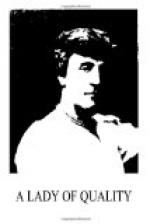Anne stood in the middle of her room and looked about at its comforts, wondering.
“Sister,” she said, “why are you so good to me? What have I done to serve you? Why is it Anne instead of Barbara you are so gracious to?”
“Perchance because I am a vain woman and would be worshipped as you worship me.”
“But you are always worshipped,” Anne faltered.
“Ay, by men!” said Clorinda, mocking; “but not by women. And it may be that my pride is so high that I must be worshipped by a woman too. You would always love me, sister Anne. If you saw me break the law—if you saw me stab the man I hated to the heart, you would think it must be pardoned to me.”
She laughed, and yet her voice was such that Anne lost her breath and caught at it again.
“Ay, I should love you, sister!” she cried. “Even then I could not but love you. I should know you could not strike so an innocent creature, and that to be so hated he must have been worthy of hate. You—are not like other women, sister Clorinda; but you could not be base—for you have a great heart.”
Clorinda put her hand to her side and laughed again, but with less mocking in her laughter.
“What do you know of my heart, Anne?” she said. “Till late I did not know it beat, myself. My lord says ’tis a great one and noble, but I know ’tis his own that is so. Have I done honestly by him, Anne, as I told you I would? Have I been fair in my bargain—as fair as an honest man, and not a puling, slippery woman.”
“You have been a great lady,” Anne answered, her great dull, soft eyes filling with slow tears as she gazed at her. “He says that you have given to him a year of Heaven, and that you seem to him like some archangel—for the lower angels seem not high enough to set beside you.”
“’Tis as I said—’tis his heart that is noble,” said Clorinda. “But I vowed it should be so. He paid—he paid!”
The country saw her lord’s happiness as the town had done, and wondered at it no less. The manor was thrown open, and guests came down from town; great dinners and balls being given, at which all the country saw the mistress reign at her consort’s side with such a grace as no lady ever had worn before. Sir Jeoffry, appearing at these assemblies, was so amazed that he forgot to muddle himself with drink, in gazing at his daughter and following her in all her movements.
“Look at her!” he said to his old boon companions and hers, who were as much awed as he. “Lord! who would think she was the strapping, handsome shrew that swore, and sang men’s songs to us, and rode to the hunt in breeches.”
He was awed at the thought of paying fatherly visits to her house, and would have kept away, but that she was kind to him in the way he was best able to understand.
“I am country-bred, and have not the manners of your town men, my lady,” he said to her, as he sat with her alone on one of the first mornings he spent with her in her private apartment. “I am used to rap out an oath or an ill-mannered word when it comes to me. Dunstanwolde has weaned you of hearing such things—and I am too old a dog to change.”




